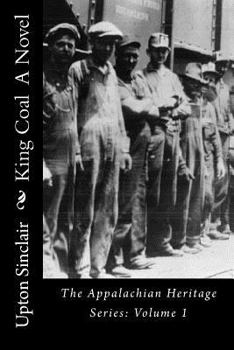King Coal
Select Format
Select Condition 
Book Overview
In this classic novel by Upton Sinclair, young Hal Warner leaves home determined to discover the truth about conditions in the coal mines. He gets a job as a miner and lives in the mining community, seeing first hand their misery and exploitation at the hands of their bosses. He befriends Mary Burke, known in the camps as "Red Mary" for her flaming red hair, and together they fight for the rights of the miners. This novel is an excellent journey into...
Format:Paperback
Language:English
ISBN:1494454211
ISBN13:9781494454210
Release Date:December 2013
Publisher:Createspace Independent Publishing Platform
Length:432 Pages
Weight:1.46 lbs.
Dimensions:0.9" x 6.0" x 9.0"
Customer Reviews
3 ratings
Dad Liked It
Published by Thriftbooks.com User , 16 years ago
I bought this book for my dad and he really liked it and highly reccomended it to me to borrow from him.
How He Spent His Vacation
Published by Thriftbooks.com User , 16 years ago
Hal Warner is a college man who visits the coal camps of Colorado to learn what they are really like. He finds out how a traveler can be arrested and robbed of his money and watch. When he makes a friend he learns about the fear that oppresses workers in a company town. A complainer can be fired and blacklisted in the whole state. Death and crippling injuries are too common, the mine bosses ignore the state laws. Education in public schools offers a view of a wider world. Otherwise the people in these camps are like medieval serfs without their many holidays and benefits. Sinclair shows his bias against drinking, as if that was the cause of the worker's poverty instead of the result. The company preacher in the company church spoke against demon rum, but not the poverty and oppression they endured. Over-work caused "industrial drinking". Miners were cheated on the amount of coal they produced. There was a caste system based on nationality. [Divide et impera?] The company supervisors tried to prostitute young women. Any accident is blamed on the victim. Hal gets a better job by paying off the boss. Hard physical labor dulled the mind and wearied the body. Workers were encouraged to spy on each other. An organizer for the United Mine-Workers shows up and explains why the workers need a union: to enforce the state laws that are ignored by the company bosses. In Book II Sinclair tells of the care needed to organize so the miners can get an honest weight for their coal. There had been a big strike once. The local government and state militia acted for the mine owners. Strike leaders were put in jail without being charged. Others were railroaded and left in a desert without food or water. Judges were forbidden to act! The strike was broken. Hal learns how the votes are counted by the coal company: their man always wins! The miners decide on what to do, and how to handle the expected violence (rely on moral force). The company concocts a reason to put Hal in jail. The marshal tells Hal how the courts and jury are rigged to railroad him to prison, perfectly legal. But Hal has a surprise for the marshal. A mine explosion occurs. Sinclair describes the effects it has below and above ground. These accidents result when the company disregards the safety laws. The mine company is slow to rescue the men; there is a profit motive there (as in Cherry Illinois)! Hal is then railroaded out of town. This fast-paced story tells about the political system that is corrupted by big corporations. Hal acts as a knight who passes many tests and difficulties to save the imperiled miners. Can people depend on the "old-school tie" to make everything right? Sinclair's writing skills have improved since "The Jungle" of 1906. This book describes life in a company town a century ago. Have things changed since? Will this past return? Sinclair is no longer totally in favor of alcohol prohibition. The examples in states showed this did not prevent the oppression that resulted in
Reminiscent of a teen hero pulp novel
Published by Thriftbooks.com User , 21 years ago
This is not a great book. The story is simple, the characters are clichéd, and the message hits the reader with the subtlety of a caveman's club. It is reminiscent of a teen hero pulp novel; a socialist "Red Planet" perhaps. Based on that assessment this book probably deserves two stars. On the other hand, Sinclair did do an effective job of researching and documenting the labor injustices of that era. Also, his writing style is remains remarkably fluid, even if it is not a showcase for the beauty of the English language. I enjoyed this book and learned something from it, even if it is not Sinclair's highest art.






